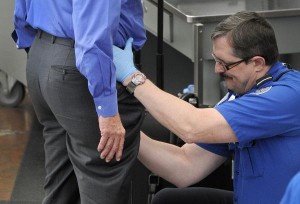There is one area (and probably many more) in which China is far saner and more reasonable than the US, and that is airport security. In fact, nearly every other country is saner. Airport security in the US is simply insane. We have crossed the brink and dived head first into insanity.
I was delighted to see the sudden flare-up of anti-TSA articles and blog posts this week, as thousands more of the infamous body scanners (and check out that link) are installed in US airports, and thousands of passengers refused to suffer the indignity and possible health repercussions of walking through them. And then there are the new, incredibly intrusive pat-downs. Don’t get me started.
In one especially shocking incident that has taken the intertubes by storm this weekend, the TSA were no better than thugs. It’s reached the point where something has to be done – like abolish the TSA.

Ever the voice of reason, James Fallows puts it all in perspective:
To make the point for the zillionth time — and, yes, I’d rather say this too often than not say it often enough — it is insane, destructive, and Maginot Line-like in thinking for the U.S. to pour out so many resources, intrude so deeply on liberties, and generate so much domestic and international ill-will in dealing with one area of potential threat, out of all proportion to what it does elsewhere. And, yes, I say this in awareness that the original 9/11 attacks were against airliners and that many terrorist groups seem to have a “terrorism theater” obsession with aviation. Even so, “security” measures that do not pass a common-sense logic test ultimately generate contempt for the entities carrying them out, and for their grasp of the challenge they are undertaking and the security/liberty balance that is involved.
It’s not airport security. It’s airport security theater, a show, an absurd, hideously expensive, intolerably invasive piece of theater, going through the motions for reasons that no one really understands. The airline pilots and flight attendants are up in arms, the travelers are up in arms, everyone is up in arms, yet the TSA keeps spitting out platitudes about keeping us safe through means everyone knows are unnecessary.
Fallows quotes from a friend of his who lived in Shenzhen for many years. This is delightful:
My favorite experience, though, was this: I tend to glower at the folks doing the bag searches before getting on the plane. I guess the agents sense the glowering because twice now, I’ve the Chinese security agents apologize to me for having to do this… one apologized and then whispered to me “Sorry. The Americans make us do this. It’s useless, I’m embarrassed.” On the other occasion, the agent verbally apologized and gave a quick head bow as he rezipped my bag.
On the flight where the first Chinese agent apologized to me, when we arrived in the US and deplaned, we were met by two US agents and a German shepherd which sniffed us all as we passed by. One of the agents must have been 250 pounds and towered over the deplaning passengers, most of whom were Asian. The agents had their batons out, guns visible, and tasers.
What a contrast – an apology from Chinese security agents at the start of the trip and intimidation upon arriving in the US. Welcome to the land of the free and home of the brave. That the governing classes who so piously mouth platitudes about American exceptionalism are silent in the face of these atrocities to the liberties of innocents says more about America’s decline than any of the numerous economic comparisons.
What is it about America that forces us into such extreme overkill? Why must we let Osama Bin Laden have the last laugh, showing him his evil act has left us so traumatized and frightened we have surrendered our critical faculties and become obsessed to the point of irrationality?
Possibly the craziest new TSA procedure is the one calling for intrusive pat-downs of the pilots as they walk to their planes. If the pilot is prone to terrorism, don’t these jackasses know that the pilots have in their hands the ultimate weapon – the plane. What’s the point of searching the pilots for weapons? Why do we keep adding more and more layers of nonsensical pseudo-security? For the answer, as usual, just follow the money.
Sorry if this is a bit overwrought, but as someone who travels a lot and who never ceases to be amazed at the hoax of airport security, I just had to let it out. Please do your part: Refuse to go through the body scanner. That’s the least we all can do. Fallows said in an earlier column some months ago that the only way to get the TSA to stop the nonsense is for enough people to object and to make their voices heard. I’m glad to see people are finally wising up and refusing to go along with this charade.
You have a far better chance of being killed crossing the street than you do of being killed in airline terrorism. Why on earth are we spending all these billions of dollars and putting people through such inconvenience for a threat that is so incredibly remote? Yes, we need airport security, but only within reason. We should follow China’s saner model – going through airport security there is relative bliss.

Comments